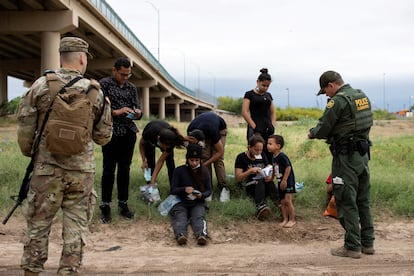A US-Mexico migratory agreement is urgently required
The immigration crisis should encourage both countries to put aside their domestic agendas and draft a regulatory framework

The bilateral agenda of Mexico and the United States is made up of many urgent matters, but none determines the daily relationship between the two countries the way immigration does. The crisis at the border, where US authorities are detaining more than 7,000 people every day, has strained the dialogue both with the Joe Biden Administration and with the Republican governors who favor the militarization of controls. The situation has become unsustainable and it is forcing Washington to define a regulatory framework without further delay, a task for which it needs Mexico. But if former president Donald Trump did it by way of imposition, Biden wants to negotiate a solution with his counterpart, Mexican President Andrés Manuel López Obrador.
The immigration crisis makes it imperative for both Mexico and the US to put aside their domestic agendas and prioritize reaching an agreement
Reaching an agreement is not going to be easy, starting with the hesitation of the White House. In late May the US government had been planning to withdraw Title 42, a regulation approved by Trump in the midst of the Covid pandemic that allows fast-track deportations under health pretexts. Republicans are using immigration to try to discredit Biden and they are threatening to seize Congress from the Democrats at the midterm elections, but Biden has already expressed support for maintaining that tool.
At the same time, López Obrador is facing this situation as he deals with a series of open fronts with the US administration. The Mexican president views these issues as grievances, and they range from pressure over security issues to questions about Mexico’s energy policy. In recent days both leaders spoke by phone and US Secretary of State Antony Blinken received a visit from Mexico’s Foreign Minister Marcelo Ebrard. They agreed on a joint plan to offer job opportunities in Central America and thus tackle the real structural causes of migration.
On Thursday of last week the Mexican president traveled to that region, known as the Northern Triangle of Central America, which is the source of most of the northbound immigration (along with tens of thousands of Haitians and Cubans). He did so with the promise of reinforcing protection at the southern border, knowing that everything that happens there ends up having repercussions sooner or later on the northern border. But before the visit, López Obrador also chided the US for sending millions of dollars in aid to Ukraine while it has not yet authorized a $4 billion investment in Central America. The message was probably aimed more at his own supporters than at being a useful diplomatic strategy. But the immigration crisis – a daily drama for hundreds of thousands of people – makes it imperative for both Mexico and the US to put aside their domestic agendas and prioritize reaching an agreement.
Tu suscripción se está usando en otro dispositivo
¿Quieres añadir otro usuario a tu suscripción?
Si continúas leyendo en este dispositivo, no se podrá leer en el otro.
FlechaTu suscripción se está usando en otro dispositivo y solo puedes acceder a EL PAÍS desde un dispositivo a la vez.
Si quieres compartir tu cuenta, cambia tu suscripción a la modalidad Premium, así podrás añadir otro usuario. Cada uno accederá con su propia cuenta de email, lo que os permitirá personalizar vuestra experiencia en EL PAÍS.
¿Tienes una suscripción de empresa? Accede aquí para contratar más cuentas.
En el caso de no saber quién está usando tu cuenta, te recomendamos cambiar tu contraseña aquí.
Si decides continuar compartiendo tu cuenta, este mensaje se mostrará en tu dispositivo y en el de la otra persona que está usando tu cuenta de forma indefinida, afectando a tu experiencia de lectura. Puedes consultar aquí los términos y condiciones de la suscripción digital.









































